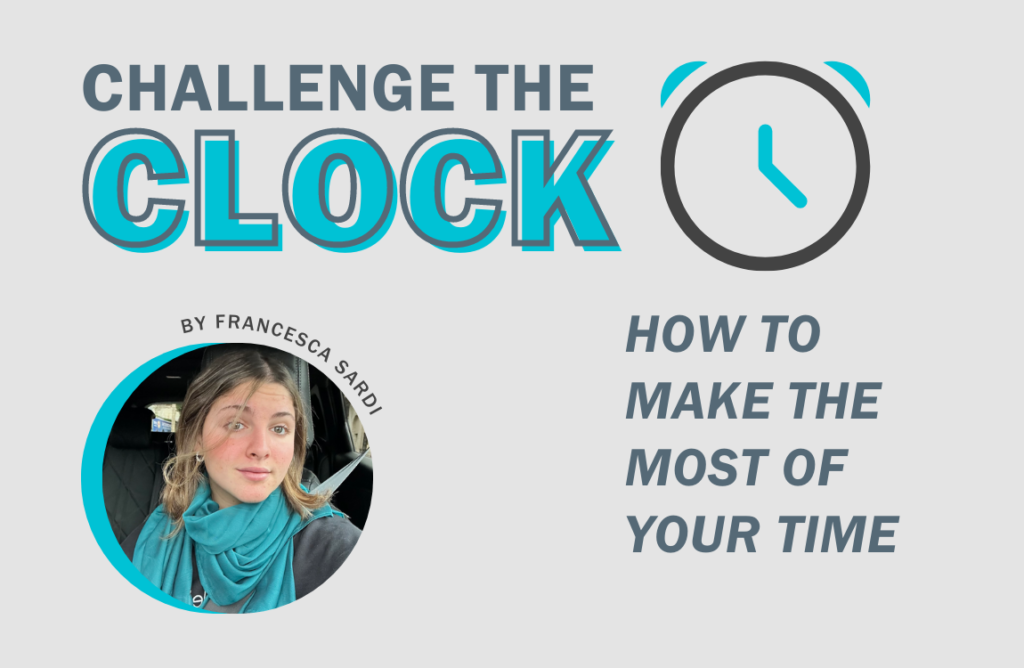Challenge the Clock: How To Make The Most Of Your Time

Have you ever wondered why you can’t complete your daily to-do list? Would you like the day to have more than 24 hours? If so, you are like me. Over time, I learned that there is a big mistake in thinking that we need more time; instead, we need to learn how to boost our energy levels.
An agenda, or a daily planner, can be your best ally in making the most out of your days. Spend five minutes every night planning your next day and establishing how much time you usually spend to complete each daily task.
While many people often use agendas to organize their days, there are not so many who write down how they feel after doing an activity. It is essential that you ask yourself what your energy levels are when starting and finishing a task. It could be that, for example, even if you like to attend networking sessions, participating exhausts you mentally or physically. For this reason, you need to understand how to optimize your energy levels throughout the day.
HOW TO MANAGE YOUR ENERGY
A great technique is to separate your activities based on your energy levels. For example, if you exercised and increased your energy levels, the optimal thing would be to use that energy and continue your day with an activity that demands a higher level of energy, such as studying for a final exam.
Whenever you feel drained, it’s important to give yourself time to rest and recharge your mind and body. You could, for instance, go for a walk, read a book or listen to music. It is recommended that this activity doesn’t last more than 15 or 20 minutes.
Another recommendation I find helpful is identifying my distractions to control how I interact with them. Avoiding all distractions is something hard to achieve – and it can be unhealthy, too. Therefore, I try to be aware that certain things or events distract me. I don’t necessarily try to avoid all of them but rather focus on modifying my interactions with them.
BECOME AN EXPERT AT MANAGING YOUR TIME, OR RATHER YOUR ENERGY
The first weeks after you start following this method will be a trial period. As days go by, you will get to know yourself better and improve your time management skills.
Don’t forget that it is very important for you to write down in your daily planner or agenda all the relevant information about your day. That is, don’t write only what tasks you must complete. Also, write down what your energy levels were throughout the day and the feelings you experienced, the distractions you had to face, what accomplishments made you proud and any other aspect that you consider influences your daily life. By following this method, I can guarantee you’ll make the most of your days.
—
DESAFIÁ AL RELOJ: CÓMO HACER QUE TE RINDA MÁS EL TIEMPO
¿Alguna vez te preguntaste por qué no llegás a completar tu lista de tareas diarias? ¿Te gustaría que el día tuviera más de 24 horas? Si es así, sos como yo.
Con el tiempo, aprendí que es un gran error pensar que lo que necesitamos es más tiempo, sino que, en realidad, lo que necesitamos es más energía.
Para lograr que tus días rindan más, tu mejor aliada va a ser una agenda. Todas las noches, dedicá cinco minutos a planear tu próximo día y a establecer los tiempos que usualmente tardás en completar cada actividad.
Si bien muchas personas suelen utilizar agendas para organizar sus días, no son tantas las que anotan cómo se sienten luego de realizar una actividad. Es esencial que te autopreguntes cuál es tu nivel de energía al comenzar y finalizar una tarea. Podría ser que, por ejemplo, aunque te guste asistir a sesiones de networking, participar en las mismas te agote mental o físicamente. Por esta razón, es necesario que sepas y entiendas cómo manejar y optimizar tu nivel de energía a lo largo del día.
CÓMO CONTROLAR TU ENERGÍA
Una gran técnica es separar tus actividades dependiendo tu nivel de energía. Por ejemplo, si realizaste actividad física y aumentó tu nivel de energía, lo óptimo sería continuar tu día con una actividad que te canse o demande mayor energía, tal como estudiar para un examen final.
Cuando te sientas agotado enérgicamente, es importante que dediques tiempo a descansar y recargar tu mente y cuerpo. Podrías, por ejemplo, salir a caminar, leer un libro o escuchar música. Lo recomendable es que esta “actividad de recarga” no supere los 15 o 20 minutos.
Otra recomendación que me es muy útil seguir es identificar y definir cuáles son mis distracciones, para poder controlar mis interacciones con ellas. Evitar las distracciones es algo prácticamente imposible y poco sano. Por lo tanto, intento ser consciente de que ciertos estímulos me distraen y me enfoco, en lugar de evitarlos, en modificar cómo me relaciono con ellos.
CONVERTIRTE EN UN EXPERTO DEL TIEMPO O, MÁS BIEN, DE TU ENERGÍA
Las primeras semanas luego de que comiences a implementar esta fórmula serán de prueba. Con el paso de los días, vas a ir entendiéndote mejor y optimizando tus tiempos.
No te olvides de que es muy importante que en tu agenda anotes toda la información pertinente sobre tu día. Es decir, no escribas solamente qué actividades debés realizar. También, anotá cuál fue tu nivel de energía a lo largo del día y cómo te sentiste, cuáles fueron tus distracciones, de qué estás orgulloso por haber logrado, y cualquier otro aspecto que consideres influyente en tu vida diaria. Siguiendo este método, te aseguro que tu día rendirá diez veces más.
Francesca Sardi is a freshman at Universidad Argentina de la Empresa (UADE) studying global communications. She is currently a member of UADE PRSSA’s Digital Communications Committee. Francesca is passionate about writing; she finds it is an interesting and exciting way to connect with other people.


I appreciated this article on tips for time management. Most people give tips on time optimization through scheduling but never the real issue behind our unproductiveness, which is our energy levels. Any PR practitioner knows how important time efficiency is and every day we are looking for better ways to tackle our to-do-lists. I know everyone in the PR industry can benefit from addressing their energy levels to handle their workload! – Katherine Williams writer/editor Platform Magazine